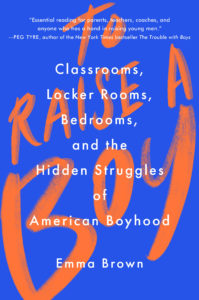Journalist Emma Brown on Raising Our Boys to Be Good Men

What does it take to raise a good man in today’s society? It’s a question Washington Post investigative journalist Emma Brown set out to answer in her new book To Raise a Boy: Classrooms, Locker Rooms, Bedrooms, and the Hidden Struggles of American Boyhood after giving birth to a son of her own in 2018. We recently spoke to Brown about her new book, her reason for writing it, and what she learned along the way.
1. Your book explores the “hidden struggles of American boyhood.” What are some of those hidden struggles and what compelled you to uncover them?
I was home on maternity leave with my six-week-old son when the first Harvey Weinstein stories were published in 2018. I watched as #MeToo stories rocketed across the media, and I wondered how I would raise my son to be different. That question took me on a journey to talk to people – coaches, teachers, parents, researchers, boys and young men – in a lot of different kinds of communities across the country. Having grown up as a girl, I’m used to thinking about what girls are up against – and I had no clue about the challenges boys deal with. They face so much shame when they challenge traditional ideas about what it means to be a boy. And yet if they buy into those ideas – that boys have to be tough and strong and sexually dominant – then they’re at greater risk for all kinds of dangerous outcomes, from binge drinking to committing sexual assault. This bind we put boys in has produced terrible outcomes for American men, whose life expectancy is five years less American women, perhaps in part because they are less likely to seek help for mental and physical health problems. Many men struggle with loneliness, and men are four times more likely than women to die from suicide.
2. In this era of “#MeToo,” how do we begin to think differently about raising our boys? What do we need to prioritize?

There are so many ways we can do a better job supporting our sons. One of the most important things we can do is give them the same message that so many of us already give our daughters: You can be and do whoever and however you dream. There is no shame in being yourself. At home, we can give our sons a safe haven to be themselves so they hold onto their natural ability to articulate feelings and connect to themselves and the people they love. And we must talk to them about relationships and intimacy. They’re hungry for that guidance, and instead of giving it to them, we oftentimes leave boys to learn about sex from online pornography. We don’t have to wait until our sons reach puberty. We can start teaching them when they’re tiny that each of us gets to be in charge of our own bodies – and each of us has a responsibility to respect what other people express about what they want for their bodies. All of these are efforts that parents can make, but we shouldn’t have to do it alone. We need the institutions that are helping raise our boys – including schools, sports teams and faith communities – to help.
3. What should parents understand better about the experience of growing up as a boy in today’s society?
One of the most shocking things I learned in the course of this reporting is how common it is for boys to be sexually assaulted – not only by older men, as we might think from the sex abuse scandals in the Catholic Church and Boys Scouts, but also by their peers, both boys and girls. But sexual violence against boys is often hidden, in part because boys feel so much shame about being victimized – and sometimes don’t even recognize what happened to them as sexual assault. We need to tell our sons exactly what we tell our daughters about the sacredness of their bodies.
4. How did your skills as an investigative reporter help you when writing this book?
The most important skill I have as an investigative reporter is my ability to build trust with people by listening to them carefully and with empathy.
This interview was featured in the March 7, 2021 edition of The Sunday Paper. The Sunday Paper publishes News and Views that Rise Above the Noise and Inspire Hearts and Minds. To get The Sunday Paper delivered to your inbox each Sunday morning for free, click here to subscribe.

